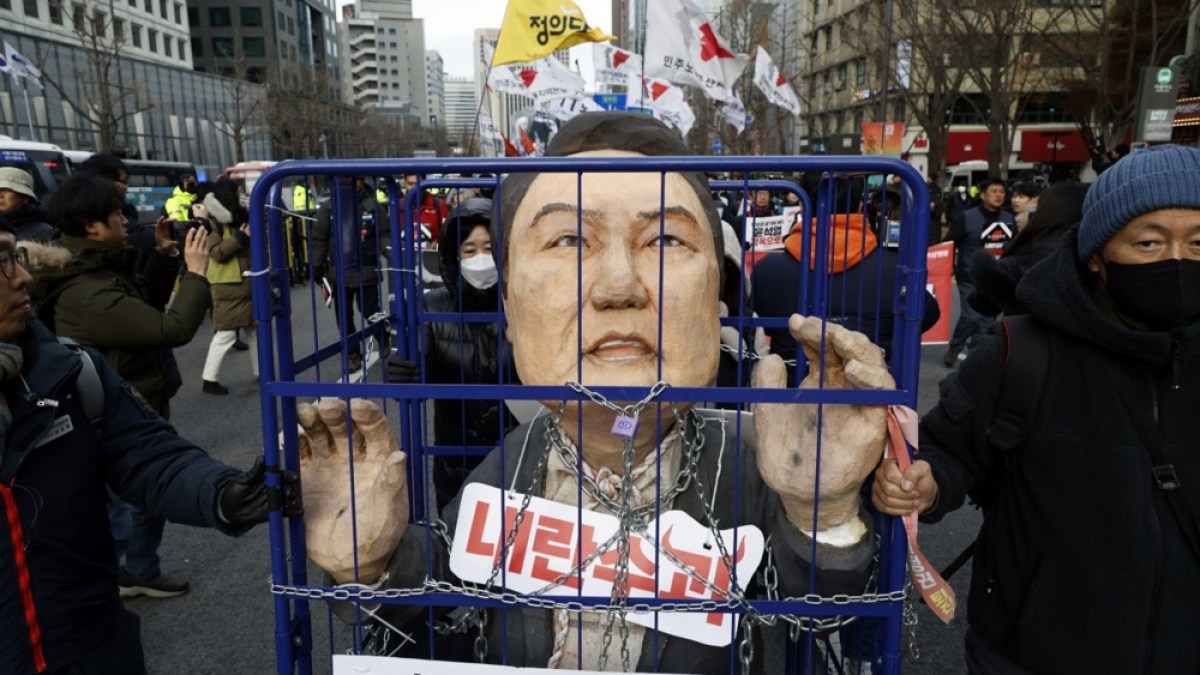

South Korean President Yoon Suk-yeol has been impeached by the National Assembly over his short-lived attempt to impose martial law, a move that plunged South Korea into political turmoil halfway through his presidency.
The unicameral National Assembly voted 204 to 85 on Saturday to impeach Yoon, the second such vote in eight days. Three members abstained and eight votes were declared invalid.
The vote was done by secret ballot, with two-thirds of the votes required for impeachment. All 300 members of the assembly cast their ballots.
Audible gasps were heard from the chamber as the result of the voting was announced. Outside, thousands of protesters greeted the announcement with applause and loud cheers.
In a statement following the vote, Yoon vowed to do his best for his country “until the end”.
“Although I am pausing for now, my journey for the future with the people over the past two and a half years shouldn’t stop,” Yoon said in a public address recorded at his residence.
“I will carry with me all the criticisms, encouragement and support I have received, and I will do my best for the nation until the end”.
Advertisement
Al Jazeera’s Rob McBride, reporting from inside the assembly building, described the mood as “sombre” after the vote.
But our correspondent said that the political impasse is not yet over as the president “has vowed to fight” his case before the court.
“But as far as the opposition and this assembly is concerned, they have not achieved what they’ve set out to do.”
What happens next?
With his impeachment, Yoon is automatically suspended from office while South Korea’s Constitutional Court deliberates his fate.
Prime Minister Han Duck-soo is taking over as the interim president.
He in a statement, Han vowed to that he “will devote all my strength and efforts to ensure stable governance.”
The Constitutional Court would then have 180 days to rule on Yoon’s future. If it backs his removal, Yoon would become the second president in South Korean history to be successfully impeached.
Park Geun-hye, another conservative president, was impeached in December 2016 and was removed from office in March 2017.

People Power Party’s stance shifts
Yoon’s conservative People Power Party (PPP) boycotted the first impeachment vote a week earlier, preventing a quorum.
Since then, PPP leader Han Dong-hoon has urged the party to participate in the voting process, although the official stance of the party rejects Yoon’s impeachment.
Ahead of the vote, at least seven PPP members said they would vote to impeach Yoon, meaning only one more vote was required to reach the 200 necessary for impeachment.

‘Weight of history’
Advertisement
An estimated 200,000 people took to the streets in the capital, Seoul, in rival rallies for and against Yoon hours before the impeachment vote.
Al Jazeera’s Eunice Kim, who is reporting from Seoul, said the “protesters came out for a historic moment, and a historic moment they got.”
“The uncertainty the South Koreans have had to live with in the past two weeks is still the same uncertainty the lies ahead,” our correspondent added, noting the protracted political fight after the impeachment.
“This is a significant moment. But I don’t think anyone is under any false pretense that the battle ahead is done.”
At the opening of the National Assembly meeting, Speaker Woo Won-shik declared that “the weight of history” was in the hands of the assembly members.
Park Chan-dae, the floor leader of the main opposition Democratic Party of Korea, declared that “Yoon is the ringleader of the insurrection”.
He added that the impeachment vote was the “only way” to “safeguard the constitution” of South Korea.
Yoon has remained unapologetic and defiant as the fallout from his martial law declaration deepened and an investigation into his inner circle widened.
His approval rating – never very high – has plummeted to 11 percent, according to a Gallup Korea poll released on Friday. An earlier survey conducted in November showed him having an approval rating of 19 percent just ahead of the martial law declaration.
The same poll showed that 75 percent of people now support his impeachment.
Related News

US says it carried out strike against ‘imminent threat’ in Syria

Syria’s opposition fighters say they are closing in on capital Damascus

Fact check: Did UnitedHealthcare murder suspect post viral Substack?


